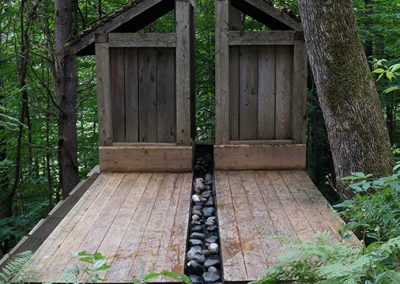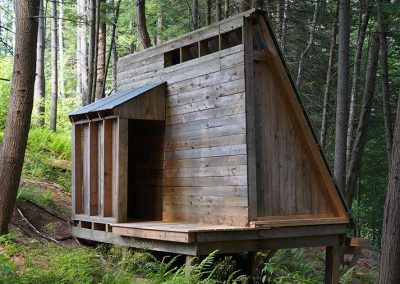About
Artist Ed Levine’s most significant project is “Vermont Village: A Conversation between Art, Water and the Land” and is sited outdoors on Back River Road’s South Royalton property. Deeply inspired by nineteenth-century author Henry David Thoreau, whose existential engagement with nature resulted in the book Walden; or, Life in the Woods, Ed spent three decades building a collection of eclectic wood structures throughout the steep and wooded property. Dozens of structures, which exist between sculpture and architecture, explore different aspects of humanity’s relationship to nature and reflect the vernacular architecture of rural Vermont. The structures appear at home in this wooded landscape. And, like the surrounding built landscape, these structures are in various states of preservation and decay. Some are sited precariously on a steep slope while others are clustered together like a small village or settlement at the bottom and top of the property. Many structures invite viewers inside using doors, windows, rooms, and seating. Many employ water; others incorporate photography, light and/or sound. All seek to reshape our understanding of the natural and constructed worlds in humorous and surprising ways.
Ed Levine’s sculptural environment will be open to the public at no charge with guided tours available during summer months starting in 2026.
Waterfall Building
Height: 12′ 9″; Width 9′ 3″; Length 15′ 3 1/2″
Hemlock wood and building materials.
Acts of Discovery
Explore the multiple temporalities of the New England landscape with Anthropology & Cultural Studies Guggenheim Fellow, Laura Ogden.
Think outside the box with Cognitive Neuroscientist, Peter Tse, and remember what it’s like to be a kid.
Unlock the magic of ‘Vermont Village’ with Author and Harpo Foundation Board Member, Meg Ostrum.
Question the implications of land use with Environmental and Native American studies professor, Nicholas J. Reo (Sault Ste. Marie Tribe of Chippewa Indians).
Discover microcosms of human interactions in nature with Agroecologist, Theresa Ong.
Land Acknowledgement
Back River Road sits on unceded ancestral land of the Abenaki people, the original inhabitants and caretakers of territory now encompassing parts of Quebec and the Maritimes of Canada as well as northern sections of New England including Vermont, New Hampshire, and upstate New York. We recognize that the Abenaki people have had a continuous presence in the region for over 10,000 years despite dispossession and genocide committed by the French, British, and the United States government. As an artist-endowed program working toward equitable representation in the visual arts, we are committed to working against systems of oppression using the power of art and creative expression.
To learn more about the ancestral homeland of the Abenaki visit: https://native-land.ca/maps/




